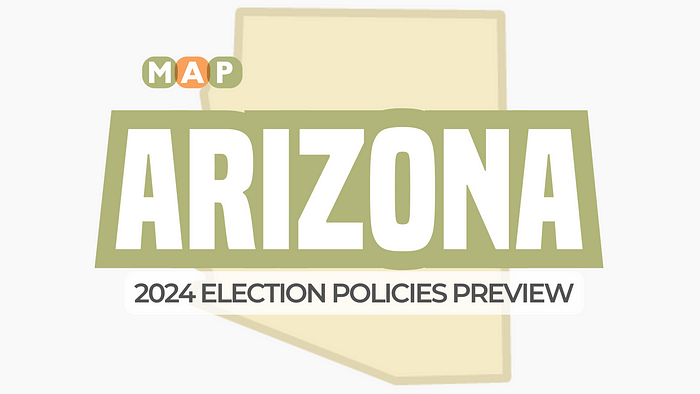2024 Election
What We’re Tracking: Four Key States’ Election Policies

From ballot drop boxes to early voting locations, Americans are already showing up to ensure their voice is heard in the 2024 presidential election. Anticipation for the election’s outcome is palpable, but we know that when it comes to results, accuracy is more important than speed, and it will take time to count every vote.
In the days leading up to Election Day, MAP’s Democracy Program is highlighting resources from its new series, which details the voting and election policies in key states based on policies that impact who votes, policies that impact how to vote, and policies that protect the vote.
Keep reading below for an annotated round-up of our state previews. To view all of our state previews, click here and learn more.
Georgia
Georgia ranks 39th in the U.S. for voting and election policies, according to our Democracy Maps tallies. While Georgia has some pro-voter policies, like post-election audits, partial automatic voter registration and limited availability of ballot drop boxes, the state also maintains a strict voter ID law, allows for state interference in election administration, and does not restore voting rights for formerly incarcerated people until a sentence is fully completed — including probation and parole.
Following the razor thin margins in the 2020 Presidential election in Georgia, and attempts by President Trump to overturn the legitimate results, Georgia continues to be a focal point for election denialism and partisan attempts to subvert the will of the people. In particular, the state Election Board, which was recently taken over by a majority of election deniers, passed a number of controversial rules much closer to the election than is typical. Recently, in mid-October, a Georgia trial court issued an order that temporarily blocked the hand counting rule passed by the state Election Board from going into effect, and though that decision was appealed, the Georgia Supreme Court maintained the block on the rule one week later.

Arizona
According to the Democracy Maps, Arizona ranks 24th in the U.S. for voting and election policies. Arizona has several policies that impact who votes and how to vote. Arizona has a strict non-photo ID law, and the state’s voter registration deadline is 16–30 days prior to Election Day. The state also requires formerly incarcerated people to take additional action in order to restore their voting rights. Arizona does, however, protect the voting process through post-election audits, a prohibition on guns in polling places, and the availability of ballot drop boxes throughout the state.
Arizona saw the closest margin of any state in the 2020 election, with President Biden winning by just over 10,000 votes. Arizona has also become a hotbed of election denialism, with multiple legal challenges filed in 2020 seeking to overturn the legitimate results of the election. In addition, partisan officials in the state conducted improper “audits” following the election, where unqualified individuals were hired to conduct reviews of ballots in an effort to undermine trust in the election results. Since 2020, the state has also seen numerous attempts by election deniers to delay certification and implement hand counting of ballots. With election denialism remaining a potent force in the state, it is safe to expect controversy in Arizona, and it will certainly be a state to watch this November.

Nevada
Nevada ranks 9th in the country for voting and election policies, according to MAP’s tallies. The state’s policies ensure that voting access is available through secure (back-end) automatic voter registration, Election Day voter registration, access to ballot boxes, and post-election audits. However, Nevada does not have a clear prohibition on guns in polling places.
Much like the other states highlighted in our series, Nevada also had a close margin in the 2020 election, with President Biden winning the state by under 35,000 votes. Similarly, the state had logistical challenges with ballot processing in 2020, in part due to the adoption of all-mail voting for the first time and allowing postmarked ballots to arrive up to four days after Election Day.
These policies have been the focus of repeated litigation and since 2020, the state has experienced a dramatic rise in election denialism. Fitting the pattern seen in other battleground states, there have also been numerous attempts to delay the certification of results and attempts to require hand counts of ballots. Additionally, voters in Nevada this year will weigh in on a ballot measure that would establish a strict photo ID requirement in the state, as well as a separate ballot measure that would establish nonpartisan top five primaries and ranked choice voting in the state going forward. With Nevada again forecasted to be closely contested, these developments are important to monitor in November.

Pennsylvania
Our last state in this series, Pennsylvania, ranks 26th in the U.S. for voting and election policies. The state provides partial (front-end) automatic voter registration, which is an improvement over traditional registration systems but is relatively less efficient than secure AVR. While Pennsylvania’s voter registration deadline precedes Election Day, the state does not require ID to cast a ballot, which ensures voter access alongside Pennsylvania’s ballot drop box availability. Pennsylvania also requires post-election audits, which protects the vote, however, the state does not have a clear prohibition on guns in polling places.
Like Georgia, Arizona, and Nevada, Pennsylvania also had a close margin in the 2020 election, with President Biden winning the state by just over a 1% margin. The state is currently forecasted by experts to be even closer in 2024 and may well decide the election. Pennsylvania was also one of the last states to finish the initial counting of votes in 2020, with unofficial results taking almost four days after Election Day. This delay was in large part caused by a significant increase in the number of voters choosing to vote by mail, combined with state law that does not allow those mail ballots to be processed prior to Election Day. Unfortunately, the state is likely to see similar delays this November, as state lawmakers have repeatedly refused to pass legislation to allow the crucial pre-processing of ballots which could alleviate some of the backlog. In addition, Pennsylvania also saw several attempts in counties in 2022 to disrupt the certification process and request frivolous recounts, which if repeated could lead to additional delays.

▸▸ Learn more
- Visit MAP’s website to read each of our 2024 state spotlights.
- View the Democracy Maps to see each of the 50+ policies we track.
- Check your voter registration status here.
- Follow MAP’s socials on Instagram, Twitter, Facebook, and LinkedIn to stay connected as we release new research and analysis.
